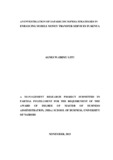| dc.description.abstract | The business environment in which organizations are operating has over the years
witnessed drastic changes. The changes are both complex and ‘chaotic’ and organizations
have found it difficult to cope with increasingly complex environments from internal
resources and competences alone. Today’s business environment is very dynamic and
undergoes rapid changes as a result of technological innovation, increased awareness and
demands from customers. Business organizations, especially the telecommunication
industry of the 21st century operates in a complex and competitive environment
characterized by these changing conditions and highly unpredictable economic climate.
Building long-term relationships with customers has become a critical strategy for most
financial institutions in today's competitive financial markets. As the current economic
environment becomes more competitive and introducing new brands becomes
increasingly costly, companies must find new strategies to increase their capacity and
competitiveness. The objective of the study was an investigation of Safaricom M-Pesa
strategies in enhancing mobile money transfer services in Kenya. The research design
adopted by the study was a case study. The study used primary data that was collected
using an interview guide. Content analysis was used to analyze the data. The findings of
the study were that Safaricom M-Pesa product is currently the market leader with a
market share of 67% of the Kenyan market share. This level of acceptance by the users is
due to its fast, reliable and convenient services, good network access and the widespread
agent network. The market positioning of the product, marketing and appropriate
capitalization of the Kenyan culture came out as yet another contributing factor to the
success of the M-Pesa. The positioning of the M-Pesa product to capture the unbanked
segment of the population especially in the lower income level bracket by providing a
product that can easily and conveniently be accessed has made the M-Pesa become
popular among the low income earners customers. Strategies used by Safaricom to
popularize the M-pesa product were an adoption of technology in the product
development that has given it an edge over the other players. This has come about due to
the increased investment in innovation and that employee’s use modern technology in
their processes. The low cost strategy model also came out as yet another strategy that is
used, Japanese concept of continuous improvement of a product or Kaizen, product
differentiation through offering M-Pesa products with unique or superior value to the
customer through product quality, features, or after-sale support. To motivate their
agents, Safaricom has also come up with different promotions that only the agents
participates in giving them higher commissions than the competitors offer. | en |

